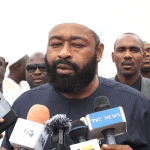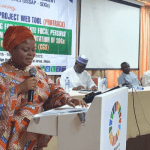Niger state governor Umaru Bago says he is open to dialogue with bandits as a non kinetic measure to make the local areas safer.
The governor disclosed this while flagging off distribution of fertilizers and farm inputs as intervention to 640 farmers across the state
Planting and harvesting seasons are some of the periods farmers suffer losses the most from increased activities of bandits.
They are either prevented from planting or their produce are seized and destroyed during harvest.
This trend has led to low agriculture yields in this state blessed with 76,000 square kilometres of arable land.
Part of the governor’s strategy to address this challenge is to try a non kinetic approach of dialogue with the bandits and the creation of a ministry to handle nomadic and pastoral affairs.
About 640 farmers are receiving farm inputs across the 25 local councils in the state under the “Fadama-Nigeria Covid19 Action Recovery and Economic Stimulus and Agro-Climatic Resilience in Semi-Arid Landscapes” programme supported by the World Bank in collaboration with the Niger State government.
The items distributed are 78 metric tonnes of NPK and Urea fertilizer, 4.75 metric tonnes of rice, maize and sorghum seeds as well as other implements.
Governor Bago declares that agriculture is the focal drive of his government. As such he directed that the balance of 900 million naira counterpart fund be paid to enable the state access to such grants.
He further disclosed a plan where every local council must cultivate 10,000 hectares of land to arrive at 250,000 hectares of farming every year.
Niger state is the biggest state in Nigeria and is a potential area to solve Nigeria’s food crisis.
Niger state governor Umaru Bago says he is open to dialogue with bandits as a non kinetic measure to make the local areas safer.
The governor disclosed this while flagging off distribution of fertilizers and farm inputs as intervention to 640 farmers across the state
Planting and harvesting seasons are some of the periods farmers suffer losses the most from increased activities of bandits.
They are either prevented from planting or their produce are seized and destroyed during harvest.
This trend has led to low agriculture yields in this state blessed with 76,000 square kilometres of arable land.
Part of the governor’s strategy to address this challenge is to try a non kinetic approach of dialogue with the bandits and the creation of a ministry to handle nomadic and pastoral affairs.
About 640 farmers are receiving farm inputs across the 25 local councils in the state under the “Fadama-Nigeria Covid19 Action Recovery and Economic Stimulus and Agro-Climatic Resilience in Semi-Arid Landscapes” programme supported by the World Bank in collaboration with the Niger State government.
The items distributed are 78 metric tonnes of NPK and Urea fertilizer, 4.75 metric tonnes of rice, maize and sorghum seeds as well as other implements.
Governor Bago declares that agriculture is the focal drive of his government. As such he directed that the balance of 900 million naira counterpart fund be paid to enable the state access to such grants.
He further disclosed a plan where every local council must cultivate 10,000 hectares of land to arrive at 250,000 hectares of farming every year.
Niger state is the biggest state in Nigeria and is a potential area to solve Nigeria’s food crisis.
Niger state governor Umaru Bago says he is open to dialogue with bandits as a non kinetic measure to make the local areas safer.
The governor disclosed this while flagging off distribution of fertilizers and farm inputs as intervention to 640 farmers across the state
Planting and harvesting seasons are some of the periods farmers suffer losses the most from increased activities of bandits.
They are either prevented from planting or their produce are seized and destroyed during harvest.
This trend has led to low agriculture yields in this state blessed with 76,000 square kilometres of arable land.
Part of the governor’s strategy to address this challenge is to try a non kinetic approach of dialogue with the bandits and the creation of a ministry to handle nomadic and pastoral affairs.
About 640 farmers are receiving farm inputs across the 25 local councils in the state under the “Fadama-Nigeria Covid19 Action Recovery and Economic Stimulus and Agro-Climatic Resilience in Semi-Arid Landscapes” programme supported by the World Bank in collaboration with the Niger State government.
The items distributed are 78 metric tonnes of NPK and Urea fertilizer, 4.75 metric tonnes of rice, maize and sorghum seeds as well as other implements.
Governor Bago declares that agriculture is the focal drive of his government. As such he directed that the balance of 900 million naira counterpart fund be paid to enable the state access to such grants.
He further disclosed a plan where every local council must cultivate 10,000 hectares of land to arrive at 250,000 hectares of farming every year.
Niger state is the biggest state in Nigeria and is a potential area to solve Nigeria’s food crisis.
Niger state governor Umaru Bago says he is open to dialogue with bandits as a non kinetic measure to make the local areas safer.
The governor disclosed this while flagging off distribution of fertilizers and farm inputs as intervention to 640 farmers across the state
Planting and harvesting seasons are some of the periods farmers suffer losses the most from increased activities of bandits.
They are either prevented from planting or their produce are seized and destroyed during harvest.
This trend has led to low agriculture yields in this state blessed with 76,000 square kilometres of arable land.
Part of the governor’s strategy to address this challenge is to try a non kinetic approach of dialogue with the bandits and the creation of a ministry to handle nomadic and pastoral affairs.
About 640 farmers are receiving farm inputs across the 25 local councils in the state under the “Fadama-Nigeria Covid19 Action Recovery and Economic Stimulus and Agro-Climatic Resilience in Semi-Arid Landscapes” programme supported by the World Bank in collaboration with the Niger State government.
The items distributed are 78 metric tonnes of NPK and Urea fertilizer, 4.75 metric tonnes of rice, maize and sorghum seeds as well as other implements.
Governor Bago declares that agriculture is the focal drive of his government. As such he directed that the balance of 900 million naira counterpart fund be paid to enable the state access to such grants.
He further disclosed a plan where every local council must cultivate 10,000 hectares of land to arrive at 250,000 hectares of farming every year.
Niger state is the biggest state in Nigeria and is a potential area to solve Nigeria’s food crisis.
Niger state governor Umaru Bago says he is open to dialogue with bandits as a non kinetic measure to make the local areas safer.
The governor disclosed this while flagging off distribution of fertilizers and farm inputs as intervention to 640 farmers across the state
Planting and harvesting seasons are some of the periods farmers suffer losses the most from increased activities of bandits.
They are either prevented from planting or their produce are seized and destroyed during harvest.
This trend has led to low agriculture yields in this state blessed with 76,000 square kilometres of arable land.
Part of the governor’s strategy to address this challenge is to try a non kinetic approach of dialogue with the bandits and the creation of a ministry to handle nomadic and pastoral affairs.
About 640 farmers are receiving farm inputs across the 25 local councils in the state under the “Fadama-Nigeria Covid19 Action Recovery and Economic Stimulus and Agro-Climatic Resilience in Semi-Arid Landscapes” programme supported by the World Bank in collaboration with the Niger State government.
The items distributed are 78 metric tonnes of NPK and Urea fertilizer, 4.75 metric tonnes of rice, maize and sorghum seeds as well as other implements.
Governor Bago declares that agriculture is the focal drive of his government. As such he directed that the balance of 900 million naira counterpart fund be paid to enable the state access to such grants.
He further disclosed a plan where every local council must cultivate 10,000 hectares of land to arrive at 250,000 hectares of farming every year.
Niger state is the biggest state in Nigeria and is a potential area to solve Nigeria’s food crisis.
Niger state governor Umaru Bago says he is open to dialogue with bandits as a non kinetic measure to make the local areas safer.
The governor disclosed this while flagging off distribution of fertilizers and farm inputs as intervention to 640 farmers across the state
Planting and harvesting seasons are some of the periods farmers suffer losses the most from increased activities of bandits.
They are either prevented from planting or their produce are seized and destroyed during harvest.
This trend has led to low agriculture yields in this state blessed with 76,000 square kilometres of arable land.
Part of the governor’s strategy to address this challenge is to try a non kinetic approach of dialogue with the bandits and the creation of a ministry to handle nomadic and pastoral affairs.
About 640 farmers are receiving farm inputs across the 25 local councils in the state under the “Fadama-Nigeria Covid19 Action Recovery and Economic Stimulus and Agro-Climatic Resilience in Semi-Arid Landscapes” programme supported by the World Bank in collaboration with the Niger State government.
The items distributed are 78 metric tonnes of NPK and Urea fertilizer, 4.75 metric tonnes of rice, maize and sorghum seeds as well as other implements.
Governor Bago declares that agriculture is the focal drive of his government. As such he directed that the balance of 900 million naira counterpart fund be paid to enable the state access to such grants.
He further disclosed a plan where every local council must cultivate 10,000 hectares of land to arrive at 250,000 hectares of farming every year.
Niger state is the biggest state in Nigeria and is a potential area to solve Nigeria’s food crisis.
Niger state governor Umaru Bago says he is open to dialogue with bandits as a non kinetic measure to make the local areas safer.
The governor disclosed this while flagging off distribution of fertilizers and farm inputs as intervention to 640 farmers across the state
Planting and harvesting seasons are some of the periods farmers suffer losses the most from increased activities of bandits.
They are either prevented from planting or their produce are seized and destroyed during harvest.
This trend has led to low agriculture yields in this state blessed with 76,000 square kilometres of arable land.
Part of the governor’s strategy to address this challenge is to try a non kinetic approach of dialogue with the bandits and the creation of a ministry to handle nomadic and pastoral affairs.
About 640 farmers are receiving farm inputs across the 25 local councils in the state under the “Fadama-Nigeria Covid19 Action Recovery and Economic Stimulus and Agro-Climatic Resilience in Semi-Arid Landscapes” programme supported by the World Bank in collaboration with the Niger State government.
The items distributed are 78 metric tonnes of NPK and Urea fertilizer, 4.75 metric tonnes of rice, maize and sorghum seeds as well as other implements.
Governor Bago declares that agriculture is the focal drive of his government. As such he directed that the balance of 900 million naira counterpart fund be paid to enable the state access to such grants.
He further disclosed a plan where every local council must cultivate 10,000 hectares of land to arrive at 250,000 hectares of farming every year.
Niger state is the biggest state in Nigeria and is a potential area to solve Nigeria’s food crisis.
Niger state governor Umaru Bago says he is open to dialogue with bandits as a non kinetic measure to make the local areas safer.
The governor disclosed this while flagging off distribution of fertilizers and farm inputs as intervention to 640 farmers across the state
Planting and harvesting seasons are some of the periods farmers suffer losses the most from increased activities of bandits.
They are either prevented from planting or their produce are seized and destroyed during harvest.
This trend has led to low agriculture yields in this state blessed with 76,000 square kilometres of arable land.
Part of the governor’s strategy to address this challenge is to try a non kinetic approach of dialogue with the bandits and the creation of a ministry to handle nomadic and pastoral affairs.
About 640 farmers are receiving farm inputs across the 25 local councils in the state under the “Fadama-Nigeria Covid19 Action Recovery and Economic Stimulus and Agro-Climatic Resilience in Semi-Arid Landscapes” programme supported by the World Bank in collaboration with the Niger State government.
The items distributed are 78 metric tonnes of NPK and Urea fertilizer, 4.75 metric tonnes of rice, maize and sorghum seeds as well as other implements.
Governor Bago declares that agriculture is the focal drive of his government. As such he directed that the balance of 900 million naira counterpart fund be paid to enable the state access to such grants.
He further disclosed a plan where every local council must cultivate 10,000 hectares of land to arrive at 250,000 hectares of farming every year.
Niger state is the biggest state in Nigeria and is a potential area to solve Nigeria’s food crisis.














